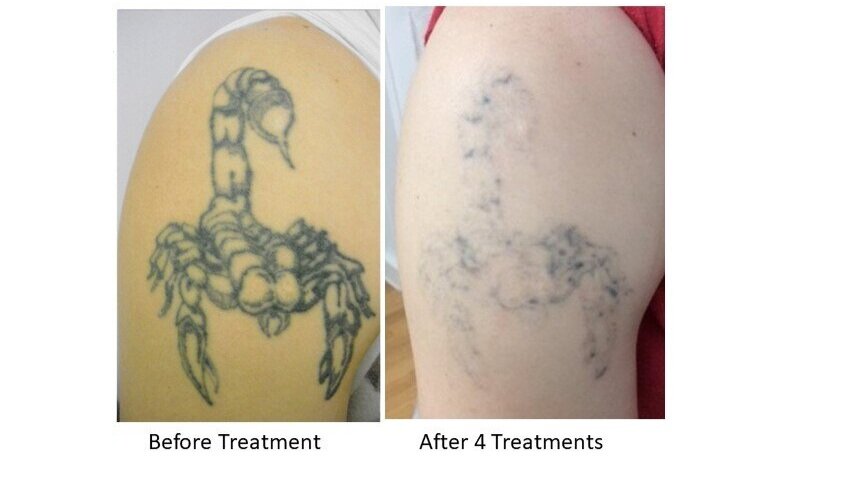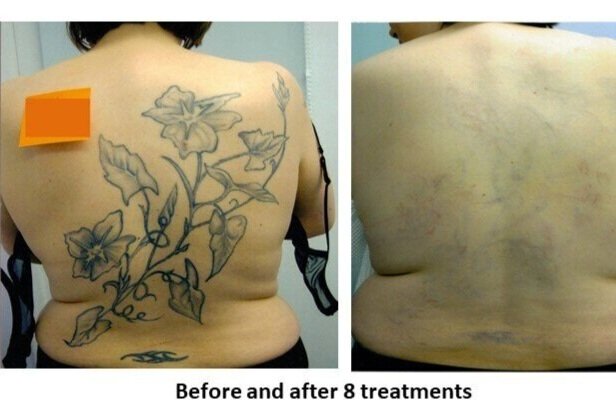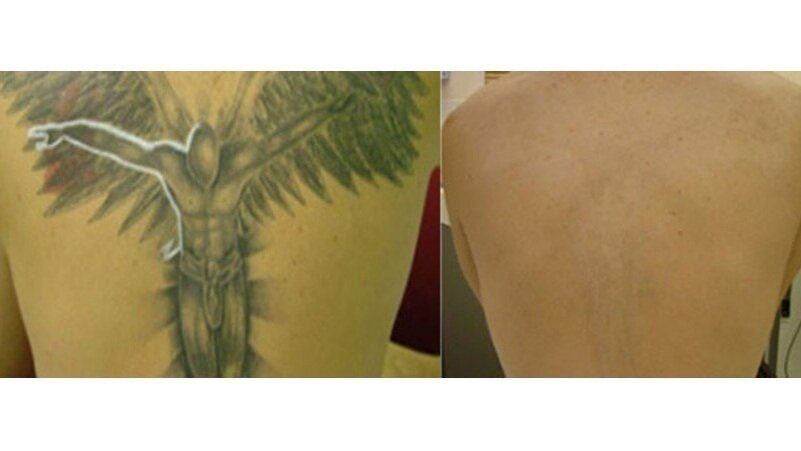Laser Tattoo Removal
For some people it can cause psychological distress and can cause difficulty getting jobs. Well live with it no longer Laserase Newcastle has been using lasers for tattoo removal since 1991.
Our tattoo removal is extremely cost effective, and as our doctors and nurses carefully assess the size and colour of every design, you can be sure of enjoying fantastic results.
We currently operate both Q-switched Ruby and Q-switched Nd:YAG lasers for all tattoo pigments.
Tattoo Removal FAQs
+ Why is a tattoo so difficult to remove?
The tattoo pigment injected into the lower layers of skin (the dermis) becomes sealed away by a tough network of collagen fibres. It is very difficult to remove the tattoo pigment without affecting the surrounding tissue. The alternatives to laser treatment are, either to physically remove the pigment with the surrounding skin by surgical excision and skin grafting, or chemically destroy the pigment using concentrated salts or acid. Not only do these techniques cause considerable discomfort, they usually require a lengthy period of after-care and will typically replace the original tattoo with a scar.
+ What lasers do we use?
We use both Q-switched Ruby and Q-switched Nd:YAG lasers to provide the complete range of options for effective laser tattoo removal.
+ How are Q-switched lasers different to other lasers used for tattoo removals?
By firing a beam of light through the skin in extremely short pulses of high energy, light. The light is absorbed by the tattoo ink creating a reaction which breaks it down into very tiny particles. These tiny particles are targeted by the body’s own immune system and gradually remove the pigment over a period of time. Because the energy is selectively absorbed by the tattoo pigment, surrounding tissues are not heated up to such a high temperature and there is no lasting damage to the skin.
+ How many treatments will be required?
Due to the very many variations in size, colour and type, there is no such thing as an average tattoo; every tattoo is different and every individual responds differently. As a guide, amateur tattoos can take anywhere from 1-10 treatments; professional tattoos from 8 – 15, although they may take more than this. Without seeing the tattoo it is impossible to be more accurate and even then, we will only be able to give an estimate.
+ What are the costs likely to be?
The actual cost of a single treatment will depend on several factors such as the size of the tattoo and the number of pulses required to treat it. The bigger the area, the more time it will take to treat and the higher the charge. Until we can see the tattoo, we cannot measure the area or price the treatment.
+ Is the treatment cost fixed throughout the course of the treatment?
As the tattoo fades away, the size of the tattoo will normally reduce (although this is not always the case; some tattoos will fade evenly without reducing in size). Consequently, treatment cost is re-assessed on an individual basis as the treatment progresses. If the size of the tattoo reduces significantly during treatment, the price will be reduced accordingly.
+ Do all tattoos respond to treatment?
Yes in the majority of the cases, although it is impossible to give an absolute guarantee as some pigments can resist treatment. Dark blues and blacks are generally the first to respond and usually all the pigment is removed. Bright colours especially greens are less predictable, they make take longer to fade and in some cases may not go entirely. The Nd:Yag laser is used to treat bright red and yellows tattoos in conjunction with the ruby laser. People who have experienced any allergic reaction to their tattoo(s) in the past should inform the doctor as this may be relevant to their laser treatment.
+ How long does the treatment take?
This depends on the size of the tattoo; a small tattoo might take 5 minutes, where a large, or multiple tattoos could take an hour or more of treatment. Again, the consultation will provide this information.
+ Does it hurt?
Yes, but the amount of pain felt will depend on the type of tattoo, the amount of treatment required and your own pain threshold. Some clients would describe it as no more than uncomfortable, where others would describe it as painful. Clients’ descriptions range from an elastic band flicked against the skin to splashes of chip fat: the truth is that you won’t know how painful you find it until you try it! Advice on pain relief will be given during your consultation.
+ Does the laser cause scarring?
Although there is a risk of scarring with any laser, in most cases, scarring is not a significant risk for tattoo removal with the ruby laser. Tattoo removal has become associated with scarring because the first lasers used for tattoo removal induced localised burning of the tissue so caused unsightly scars and often left the patient more disfigured than with the original tattoo. The ruby laser does not heat the surrounding skin significantly and the risk of scarring is much reduced. Since opening at the Freeman Hospital in 1991 we have treated many thousands of tattoos with the vast majority of people being delighted with the results. Although scarring is a possibility and does occur in some patients, we have found the incidence of this to be low.
+ Will the skin be normal when treatment is finished?
During treatment with the Q-Switched Ruby Laser, it is quite normal for the tattooed area to become paler and any freckles may disappear. This is because the laser is also effective at removing natural skin pigment. Once all the treatments have been completed, the pigment should slowly return, sometimes within six to twelve months, although in other cases several years. However sometimes there may be a permanent loss of natural pigment and the area may remain pale. If this does occur, continued protection from strong sunlight and sun beds is recommended. A tattooed area which is particularly hairy should be shaved prior to treatment. The hair should grow back normally in some cases may be slower than expected.
+ Is Laserase treatment safe?
Yes, there is no evidence whatsoever to suggest that the treatments can lead to skin disorders or an increased risk of skin cancer. Laserase Newcastle has been successfully removing tattoos for more than 30 years and have treated thousands of tattoos safely.





